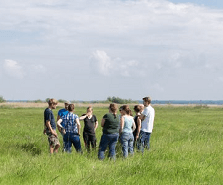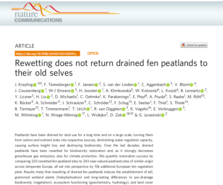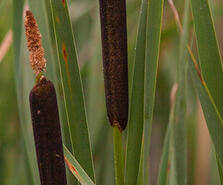Work packages
The transdisciplinary research approach builds on the experience and expertise of the involved partners. The project links information on soil-water-crops interactions as a basis for biomass productivity with genetics related to the productivity of genotypes under different (changing climatic) conditions. The role of nutrient removal, retention and supply is taken into account to improve productivity and to address other ecosystem services.
Micro-economic studies of site management, harvest and bioenergy use potentials in various European regions are combined with Life Cycle Assessments to assess sustainability capability and the provision of ecosystem services.
A review of political and legal boundary conditions will show current opportunities and constraints for large scale implementation of paludiculture and allows recommendations on how to support paludiculture.
The project will involve close communication with and dissemination of project results to stakeholders – farmers, scientist, practitioners, authorities, consultants – from participating countries, e.g. by demonstrating various aspects of wet peatland use at pilot sites. Also other European regions are taken into consideration to introduce wet peatland use.
Agriculture on organic soils under wet conditions is innovative. The project wants to develop and strenghten farming techniques and economic tools to make it work as a basis for large scale implementation. With a strong science based transdisciplinary approach the project will facilitate this innovative strategy to adapt to climate change – with sustainable peatland utilisation becoming part of resilient agricultural regions.
General project coordination
Organisation and administration of the entire project, including financial, logistic, and efficiency control, and coordination of the interaction of the various work packages and tasks.
Sustainability-, micro- and macro-economic assessments
Micro-economic studies of site management, harvest and bioenergy use potentials in various European regions are combined with Life Cycle Assessments to assess sustainability capability and the provision of ecosystem services. The benefits for common welfare will be assessesed and instruments for further implementation will be elaborated.
Outreach and dissemination of project results
The project progress and results will successfully be communicated to stakeholders, farmers, authorities, and the scientific community for awareness-raising, increasing acceptance of wet peatland use, and (potential) implementation of these approaches into practise in the participating countries as well as a prospective realisation in further European regions.
Responsibilities Ensurance of overall project performance, Coordination of individual research contributions, Economic monitoring and analysis of land use concepts, Socio-economic aspects of CSA on peatland, Biomass utilisation.
Specific contributions Comprehensive knowledge on paludicultures, Peatland library and databases, Expertise in economic, LCA and sustainability assessment, Extensive network of national and international stakeholders.
Provision of bio-genetic expertise
Maximizing biomass productivity and nutrient sequestration in wetland vegetation is a function of plant growth responses to nutrient, water, and light availability and plant genetic makeup, mediated by ecophysiological processes including photosynthesis, carbon translocation, biomass allocation, and internal nutrient cycling.
Work package 2 will provide information on how these processes vary across Europe for three highly productive wetland plants, Phragmites australis (Common Reed), Typha spp. (Cattail) and Arundo donax (Giant Reed).
Responsibilities Applied genetics of Reed, Selection of varieties for different applications, Interaction of nutrient, soil and water systems, Knowledge transfer.
Specific contributions Expertise in selection of genotypes of (mainly) Common Reed, Cattail and Giant Reed.
Coordination of studies on nutrient retention
The objective of this work package is to quantify nutrient removal rates as a key ecosystem service of wetlands and paludiculture farming systems.
In addition to uptake in vegetation, nitrogen is removed from water through denitrification, and phosphorus is removed through sedimentation and adsorption, upon fertilization or inlet of nutrient rich surface waters. Estimating nutrient removal by biomass harvest will provide thresholds for minimal nutrient input to close budgets. This information is vital for proper soil management fostering stable harvests.
Responsibilities Nutrient fluxes in constructed wetlands and peatlands, Interaction between nutrients and harvesting/ site management.
Specific contributions Expertise on constructed wetlands for nutrient retention, Site specific ecological parameters and biomass utilisation options.
Study of crop-soil-water-interactions (biogeochemistry)
Similar to dry agriculture, the production in paludiculture can only be optimized if soil conditions such as nutrient availability for crops are sufficient and balanced with respect to the different nutrients. However, nutrient biogeochemistry of permanently or temporarily wet soils strongly differs from that of conventional dry agricultural soils.
The scientific and economic objective is to optimize water level and consequently nutrient turnover such that not only above-ground production, but also belowground carbon storage is optimized. In addition, the emission of greenhouse gases (GHG) from soils and losses of nutrients to the surrounding environment have to be minimized.
Coordination of (corporate) fieldwork
The field work of the project will concentrate on jointly used core sites. Thus synergies between expertise of the research providers in the consortium are assured and crop production related to soil, climate conditions and genetic characteristics, nutrient removal and supply, biogeochemistry – of soil, water and carbon dynamics will be closely combined at the same sites.
The overall analysis of these data will provide new perspectives how to manage rewetted peatlands and constructed wetlands for crop cultivation.
Responsibilities Investigations on crop-soil-water-interactions (biogeochemistry), Coordination of (corporate) fieldwork.
Specific contributions Estimation of carbon balance, Modelling of water level and nutrient input to minimise THG emissions and nutrient leakage.












